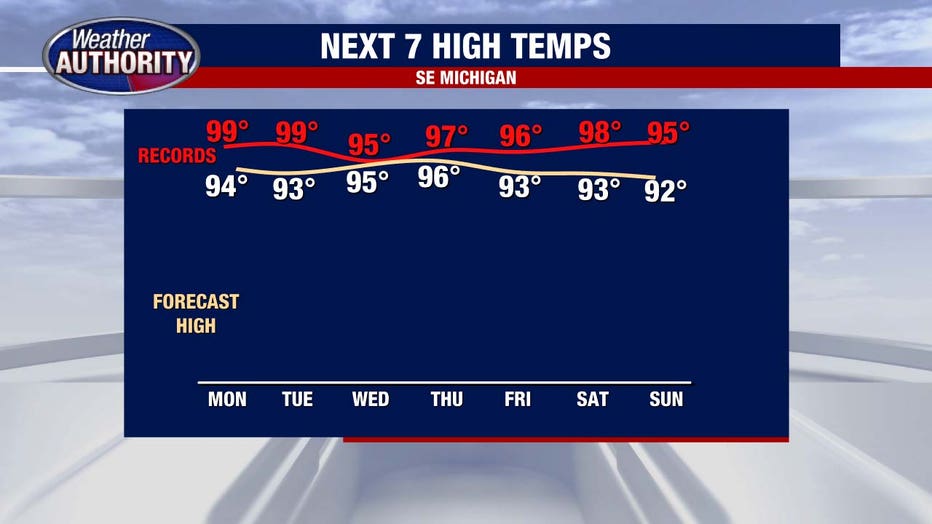Tips for keeping pets safe in hot weather

Beat the heat this week with these tips
Metro Detroit is going to get hot this week - very hot. There's a few tips that people can take with them before heading out for the day to stay safe, which include drinking more fluids than usual and keeping out of the sun.
DETROIT (FOX 2) - Pets are at risk as temperatures spike this week.
High temperatures in Metro Detroit will hit the 90s on Monday and stay there through the week. With the heat index, it will feel closer to 100 degrees or more.
That heat plus humidity can be life-threatening for pets.
"High humidity amplifies the negative impact of high temperature on your pet — and in combination, these factors magnify the danger zone," says Dr. Barbara Hodges, with the Humane Society Veterinary Medical Association. "When animals pant, moisture from their lungs evaporates and helps reduce their body heat. But high humidity conditions hamper that process and their ability to cool themselves, and their body temperature can skyrocket—rapidly—to dangerous, or even lethal, levels."
Pet hot weather tips
Provide fresh water for your pet
Be sure your pet has plenty of fresh water, especially when they are outside.
Limit time outside
Limit your pet's time outside during the heat, especially peak midday temperatures. If you do take your dog on a walk, walk them on the grass or put them in shoes designed to limit their exposure to heat through their paws. Also, bring water along on your walks.
Make sure your yard has a shady spot for your pet when they are outside.
Don't leave them in a hot vehicle
If you are going somewhere that you can't bring your pet inside with you, leave them at home. Temperatures inside your vehicle can rise quickly even when the windows are cracked or you are parked in the shade.

Heat stroke in pets
Like humans, pets can experience heat stroke.
Signs of heat stroke in pets
According to the Humane Society, pets that are older, very young, overweight, or have heart and respiratory disease are more susceptible to suffering from heat stroke, though all pets are at risk.
Signs to look for in your pet include
- Heavy panting
- Glazed eyes
- Rapid heartbeat
- Difficulty breathing
- Excessive thirst
- Lethargy
- Fever
- Dizziness
- Lack of coordination
- Profuse salivation
- Vomiting
- A deep red or purple tongue
- Seizure
- Unconsciousness.
Checking your pet's temperature can help you determine if they are experiencing heat stroke. Your dog's temperature should not exceed 104 degrees.
What to do if your pet has heat stroke
If your pet has heat stroke, you should take them to the vet because the condition can be deadly. As you prepare to bring your pet to the vet, cool them down by giving them water or ice cubes. Also, apply ice packs or cold towels to their upper body, including head and neck.


